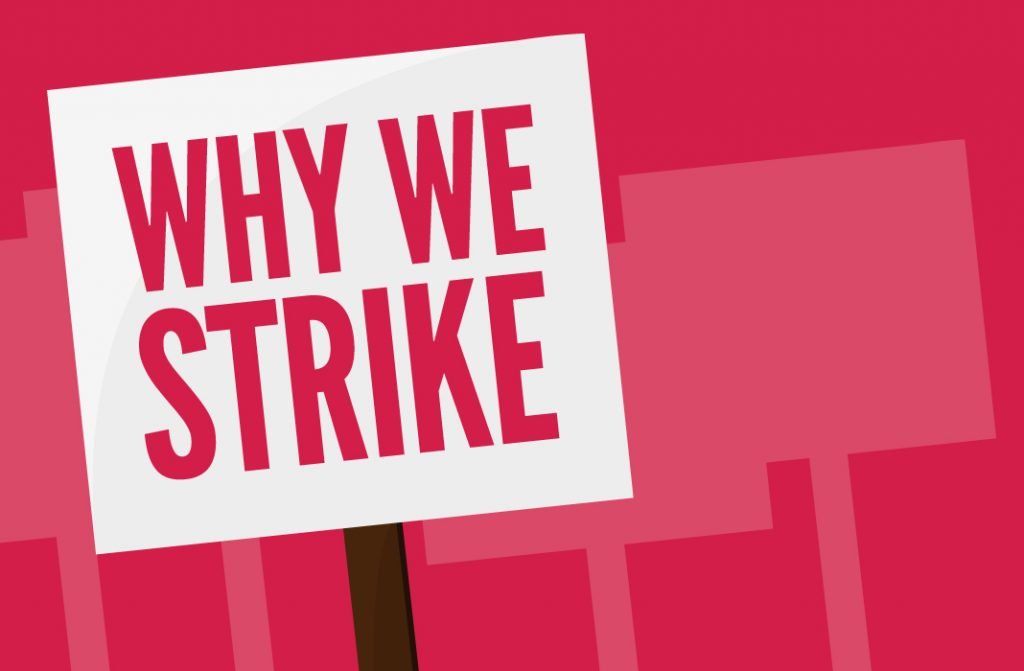Why we strike
Let’s face it: no one enjoys going on strike. In Canada, the overwhelming majority of collective agreements are signed without ever having to resort to job action. But in rare cases, a strike is necessary.
Members who vote in favour of strike action don’t do it lightly or flippantly; it’s a last resort meant to nudge an employer from their uncompromising position.
Workers who choose to strike do it knowing that their lives will be disrupted. And while they may enjoy the support of their fellow union members, the same can’t always be said about the general public.
That needs to change.
The public discourse around strikes tends to focus on their inherently disruptive nature. Just like protests and acts of civil disobedience, strikes are meant to inconvenience a person or two; rights and benefits aren’t usually won just by asking nicely.
But the disruption is just one part of the equation. The truth is that strikes have a history of improving working conditions for the broader working class – not just those who go on strike.
Their pain is your gain.
If you’re not working a 12-hour workday today, it’s thanks to the Toronto workers who left their printing presses and took to the streets, back in 1872. They paved the way for the eight-hour workday that we enjoy today.
When postal workers walked off the job in 1965 – a wildcat strike – they not only obtained increased salaries and better working conditions, their strike was so disruptive that it forced the government to rethink its approach to labour relations. What followed was the Public Sector Staff Relations Act of 1967, which granted collective bargaining rights to most federal civil servants while imposing rules as to how and when unionized employees could strike or seek arbitration. Civil servants unionized in record numbers; together, they formed the Public Service Alliance of Canada. Soon after, provincial governments would pass their own versions the PSSRA.
More recently, the Canadian Union of Postal Workers’ 1991 strike paved the way for the parental leave all Canadians enjoy today. After a grueling 42-day strike, CUPW members won the right to “17 weeks’ maternity leave at full pay as well as the inclusion of maternity leave in the calculation of benefits such as severance pay.” After the postal worker’s successful strike, paid maternity leave “soon spread throughout the public and para-public sectors”.
Their pain; your gain.
It’s for this reason that working-class Canadians, whether unionized or not, should support their counterparts whenever they go on strike. Moreover, striking workers are often a force for good when it comes to improving the very services they provide.
In the Yukon, there are currently 20 PSAC members – counsellors and support service workers – who are striking for better working conditions. As part of their demands, they are also asking for more flexible working hours so that they can better serve their clients.
“We are striking so we can continue to help the individuals, couples, children, and families in all Yukon communities that we serve, when they need us.”
Meanwhile, after a month of rotating strikes, members of the Canadian Union of Postal Workers are facing the real possibility that the federal government may legislate them back to work. Every Canadian should strongly and loudly oppose this move by the Trudeau government.
The right to strike has been recognized by the Supreme Court of Canada. In Saskatchewan Federation of Labour v. Saskatchewan, the Court declared that strikes are “an essential part of a meaningful collective bargaining process in our system of labour relations.”
The right to strike is not merely derivative of collective bargaining, it is an indispensable component of that right. Where good faith negotiations break down, the ability to engage in the collective withdrawal of services is a necessary component of the process through which workers can continue to participate meaningfully in the pursuit of their collective workplace goals. This crucial role in collective bargaining is why the right to strike is constitutionally protected by [the freedom of association guaranteed by the Canadian Charter of Human Rights and Freedoms]
The fact the federal government is even mulling a legislative recourse to the CUPW strike ought to be concerning, especially in light of the 2015 Supreme Court decision. The union has vowed to take the matter to court, should they be legislated back to work.
The right to strike is a constitutional right – and one whose reverberations improve the working conditions of all working-class Canadians. It should be protected and celebrated.
UCTE wishes to extend its unwavering support to its striking counterparts who are members of the Yukon Employees’ Union and the Canadian Union of Postal Workers. Solidarity!
